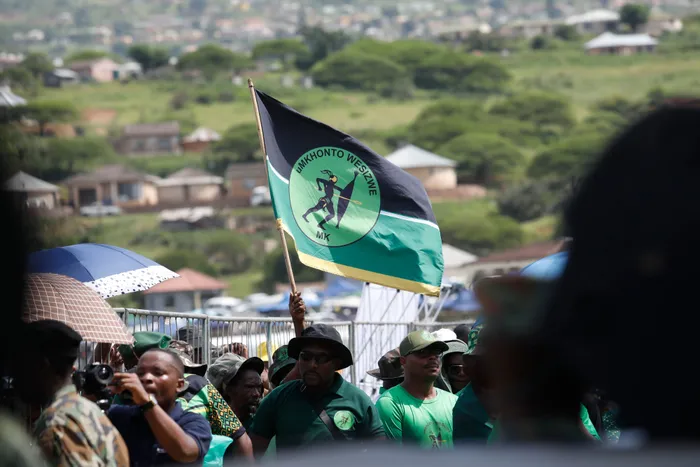
The MK Party viewed SA's removal from the greylisting with "great caution", rejecting any notion of it being a "panacea to our ongoing struggle against financial crimes and corruption".
Image: Doctor Ngcobo / Independent Newspapers
South Africa's removal from the Financial Action Task Force (FATF) greylist has elicited sharply contrasting reactions within the nation's political sphere.
While the ANC hails this as a major achievement, the uMkhonto weSizwe Party (MK Party) has adopted a guarded, even critical, stance.
The ANC, in a statement brimming with optimism, hailed the announcement as a "direct outcome of decisive and coordinated action" across various government entities and the financial sector.
"South Africa's removal from the greylist is a vote of confidence in our country's reform agenda and in our determination to ensure accountability, transparency, and ethical governance," the party wrote in a statement.
The ANC emphasised that the fight against corruption and illicit financial flows must remain a national priority to safeguard democracy and ensure public resources benefit all citizens.
However, the MK Party viewed the development with "great caution", rejecting any notion of it being a "panacea to our ongoing struggle against financial crimes and corruption".
Its statement asserted that "much more still needs to be done to confront the deep-rooted challenges that continue to enable illicit financial flows and criminal activities in our country".
The MK Party's skepticism is rooted in several critical concerns.
It pointedly questioned the removal while linking it to allegations surrounding President Cyril Ramaphosa's Phala Phala farm incident, where he was reportedly found in possession of undeclared foreign currency.
"It is laughable that South Africa could be removed from the greylist when Mr Ramaphosa himself was found in possession of undeclared foreign currency in his couch," the MK Party said, highlighting what it perceives as a double standard.
It also lamented the continued "illicit financial flows" draining national mineral resources for the benefit of the West, rather than for the local economy and its people.
Beyond specific incidents, the MK Party expressed deep concern over the "unabated increase in illicit tobacco and alcohol trading", which it claims undermines legitimate industries and deprives the state of crucial revenue.
It further accused "porous ports of entry" of serving as conduits for smuggling and illicit financial activities, costing South Africa billions. A particularly damning accusation was levelled against the banking sector.
"Another cause for concern is the banks, which have become catalysts for money laundering, illicit financial flows, and currency manipulation."
The party called for intensified efforts to "dismantle these networks to end the manipulation of the state by criminal syndicates and corrupt business interests".
The MK Party warned against the illusion that the greylist removal automatically translates into greater investment or improved economic conditions.
"To believe so is to fall for yet another illusion presented by the first world, suggesting that compliance and alignment with their interests will yield prosperity," the party said, adding that "history has shown that such expectations never materialise".
For them, the South African economy remains "structurally unchanged, still plagued by unemployment, poverty, and inequality that demands bold and radical transformation".
"Therefore, this removal from the greylist is not cause for celebration," the MK Party concluded, urging that the focus must not be diverted from the "urgent task of achieving fundamental and radical economic transformation".
It stressed that only "real structural change, accountability and the eradication of corruption at all levels can South Africa truly liberate itself from economic exploitation and injustice".
While acknowledging the symbolic and practical benefits of being off the greylist, economists and financial analysts caution against overstating its immediate impact on the broader economic landscape.
Senior economist at a leading Johannesburg-based think tank, Dr Sipho Dlamini, said: "Being removed from the grey list is undoubtedly a positive development for South Africa's international standing and reputation.
"It signals to international investors that the country is serious about combating financial crime and adheres to global standards. This can potentially reduce the cost of doing business with South Africa and ease some transactional burdens for financial institutions."
However, Dlamini reportedly echoes some of the MK Party's concerns regarding the deeper structural issues.
"While the greylisting addressed specific deficiencies, it didn't fundamentally alter the underlying economic challenges of high unemployment, inequality, and a lack of inclusive growth," he explained.
"Foreign direct investment is influenced by a multitude of factors, including political stability, policy certainty, infrastructure, and ease of doing business – not solely by FATF compliance."
He added that while the greylist removal might create a more favourable environment, sustained economic growth and a significant influx of investment will depend on ongoing reforms that address governance, infrastructure, and an efficient public sector.
"The fight against corruption and illicit financial flows needs to be continuous and demonstrably effective, beyond just meeting international benchmarks. Public confidence and the rule of law are paramount," Dlamini said.
mashudu.sadike@inl.co.za
Related Topics: